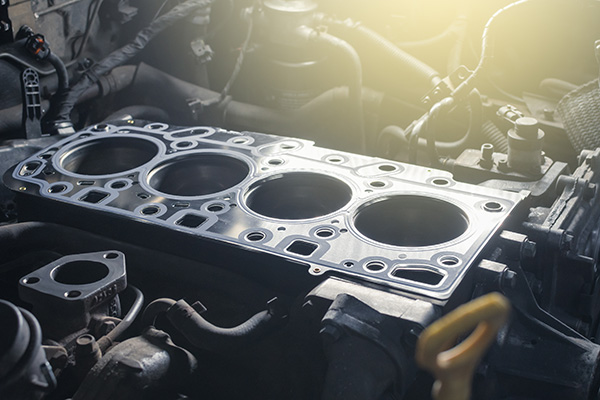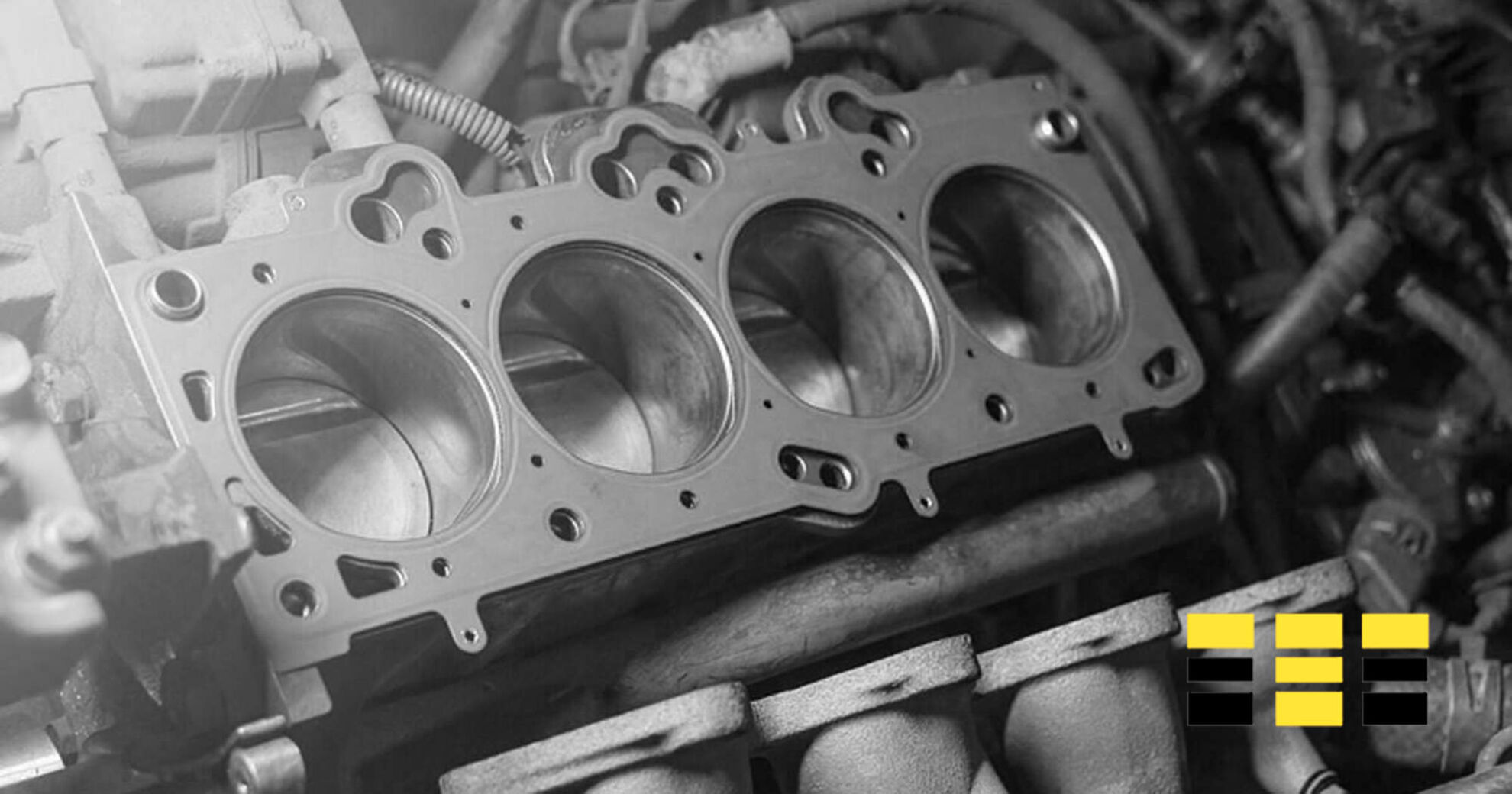As an Amazon Associate, I earn from qualifying purchases
Have you noticed your car’s temperature gauge creeping higher than usual? You might be wondering, “Can a head gasket cause a car to overheat?” The answer is yes, and it’s more common than you think.
Understanding how a head gasket affects your engine’s temperature can save you from costly repairs and keep your car running smoothly. You’ll discover the key signs of a head gasket problem and why it leads to overheating. Keep reading—you’ll learn what to watch for and what steps to take if your car starts to overheat unexpectedly.
Role Of The Head Gasket
The head gasket plays a key role in your car’s engine. It sits between the engine block and the cylinder head. Its main job is to seal the cylinders and keep the engine running smoothly.
This small part stops coolant and engine oil from mixing. It also keeps the pressure inside the cylinders. Without a good seal, the engine can lose power and run poorly.
Sealing Combustion Chambers
The head gasket seals the combustion chambers tightly. This keeps the pressure from escaping during combustion. Proper sealing means the engine can produce the right power.
If the gasket fails, pressure leaks out. This reduces engine power and efficiency. The engine may also run hotter than usual.
Separating Coolant And Oil Passages
The head gasket stops coolant and oil from mixing. Coolant cools the engine, and oil lubricates moving parts. Mixing these fluids can cause engine damage.
A broken gasket can let coolant enter the oil system. This causes poor lubrication and overheating. Oil in the coolant can also block the cooling system.
Maintaining Engine Temperature
The head gasket helps the engine keep the right temperature. It ensures coolant flows correctly through the engine. This prevents overheating and engine damage.
A damaged gasket can cause coolant leaks. Without enough coolant, the engine temperature rises fast. Overheating can lead to costly repairs or engine failure.

Credit: www.capitol-chevy.com
How Head Gasket Fails
The head gasket is a key part of a car’s engine. It sits between the engine block and the cylinder head. Its job is to seal the engine and keep fluids from mixing. When the head gasket fails, it can cause serious problems. One major issue is engine overheating. Understanding how the head gasket fails helps you spot trouble early.
Heat and pressure inside the engine can damage the head gasket. Small cracks or holes may form. These allow coolant and oil to leak or mix. The engine loses its ability to stay cool. Overheating follows quickly. Knowing the reasons behind the failure can save your car.
Overheating And Warping
Extreme heat makes metal parts expand. The cylinder head can warp or crack. This damages the head gasket’s seal. Coolant leaks out or gets into the engine cylinders. The engine runs hotter than normal. This starts a cycle of damage and overheating.
Coolant Leaks
The head gasket stops coolant from leaking. When it fails, coolant escapes outside the engine. Low coolant levels cause the engine to overheat fast. Leaks can also let coolant enter the combustion chamber. This affects engine performance and temperature control.
Oil Contamination
A broken head gasket can mix oil with coolant. This weakens the oil’s ability to protect engine parts. Dirty oil causes friction and heat inside the engine. Overheating and engine damage become more likely. Oil contamination is a clear sign of gasket failure.
Compression Loss
The head gasket keeps engine compression tight. When it fails, compression escapes. This reduces engine power and efficiency. The engine struggles to maintain normal temperature. Overheating often follows because the engine works harder.
Signs Of A Blown Head Gasket
Recognizing the signs of a blown head gasket is key to protecting your car. A faulty head gasket can cause serious engine problems, including overheating. Knowing what to watch for helps you act fast and avoid costly repairs.
Coolant Loss Without Visible Leaks
Coolant disappearing without obvious leaks is a common sign. The gasket may allow coolant to enter the engine cylinders or mix with oil. This reduces coolant levels and causes the engine to heat up quickly.
White Smoke From The Exhaust
White smoke coming from the exhaust pipe indicates coolant burning in the engine. This happens when the gasket fails and coolant leaks into the combustion chamber. The smoke looks like steam and often has a sweet smell.
Overheating Engine
An overheating engine is a clear symptom of a blown head gasket. The gasket’s failure disrupts the cooling system’s function. The engine temperature rises and may trigger warning lights on the dashboard.
Milky Oil On The Dipstick
Check the oil dipstick for a milky or frothy appearance. This means coolant is mixing with the engine oil. The mixture looks like chocolate milk and signals gasket damage.
Loss Of Engine Power
A damaged head gasket causes a loss of compression in the engine. This results in reduced power and poor performance. The car may struggle to accelerate or run smoothly.
Connection Between Head Gasket And Overheating
The head gasket plays a key role in your car’s engine. It seals the engine block and cylinder head. This seal keeps the engine’s fluids separate. When the head gasket fails, the engine can start to overheat. This happens because the fluids mix or leak. Overheating can cause serious damage to the engine.
Understanding the link between a head gasket and overheating helps spot problems early. It also helps avoid costly repairs. The head gasket’s condition affects the engine’s cooling system. The cooling system’s job is to keep the engine at the right temperature. If the head gasket breaks, the cooling system may fail. This failure leads to overheating issues.
What Does A Head Gasket Do?
The head gasket seals the cylinders in an engine. It keeps coolant and oil from mixing. It also maintains pressure inside the cylinders. This pressure is needed for the engine to run well. A good seal prevents leaks and engine damage.
How A Blown Head Gasket Causes Overheating
A blown head gasket lets coolant leak into the engine. Coolant loss reduces the system’s ability to cool the engine. Hot spots form where coolant is missing. These hot spots cause the engine to overheat. Leaked coolant can also enter the oil, damaging the engine further.
Signs Of Head Gasket Problems And Overheating
Look for white smoke from the exhaust. This smoke means coolant is burning in the engine. Check the oil for a milky color. This shows coolant has mixed with the oil. Notice if the temperature gauge rises quickly. These signs suggest a head gasket issue causing overheating.
Coolant Leaks And Engine Heat
Coolant plays a key role in keeping your engine cool. It flows through the engine, absorbing heat. If the coolant leaks out, the engine loses its main way to stay cool. This can cause the engine to overheat quickly.
A head gasket seals the engine’s cylinders and coolant passages. When it fails, coolant can leak inside or outside the engine. This leak reduces the coolant level, making the engine run hotter.
How Head Gasket Leaks Affect Coolant Levels
A broken head gasket can create small cracks or holes. Coolant escapes through these openings. The loss may be slow but steady. Over time, low coolant causes overheating and engine damage.
Signs Of Coolant Leaks From A Head Gasket
Look for puddles under the car or a sweet smell from the engine. White smoke from the exhaust can also mean coolant is burning inside. These signs suggest a head gasket leak.
Engine Heat Rise Due To Coolant Loss
Coolant carries heat away from the engine. Without enough coolant, heat builds up quickly. The engine temperature gauge will rise above normal. This overheating can cause serious engine problems.
Combustion Gases In Cooling System
Combustion gases in the cooling system cause serious engine problems. The head gasket seals the engine block and cylinder head. When it fails, gases from the combustion chamber can enter the cooling system.
These gases create pressure and heat inside the radiator and hoses. The cooling system cannot work properly. This leads to the engine overheating quickly.
How Combustion Gases Enter The Cooling System
The head gasket stops gases from escaping the combustion chamber. A blown or damaged gasket lets these gases leak. The gases mix with the coolant in the radiator and hoses. This causes bubbles and foam in the coolant.
Effects Of Combustion Gases On Engine Cooling
Bubbles in the coolant reduce its ability to cool the engine. The pressure from gases can cause the radiator to fail. Hoses may burst or leak because of increased pressure. The engine overheats as coolant flow becomes irregular.
Signs Of Combustion Gases In The Cooling System
Watch for coolant bubbles while the engine runs. The coolant level drops without visible leaks. The engine temperature rises even with enough coolant. White smoke may come from the exhaust pipe. These signs suggest gases have entered the cooling system.
Impact On Engine Performance
The head gasket plays a key role in engine performance. It seals the engine’s cylinders and keeps coolant and oil separate. A damaged head gasket can cause many engine problems. One major issue is overheating.
Overheating can reduce engine power and efficiency. This affects how well the car drives. Understanding this impact helps spot head gasket problems early.
Loss Of Engine Compression
The head gasket seals the combustion chamber. A blown gasket lets air escape. This lowers engine compression. The engine loses power and runs rough. The car may struggle to accelerate.
Coolant And Oil Mixing
A damaged gasket allows coolant and oil to mix. This causes poor lubrication. Engine parts wear out faster. Overheating increases as the cooling system fails. Engine damage becomes more likely.
Increased Engine Temperature
Coolant leaks from a faulty gasket reduce cooling. The engine temperature rises quickly. High heat damages engine parts. The car may stall or break down.

Credit: www.mintautoservice.ca
Diagnosing Head Gasket Issues
Diagnosing head gasket issues is key to stopping car overheating. Early detection saves money and prevents engine damage. Knowing signs and tests helps you act fast and avoid bigger problems.
Watch for unusual symptoms. Learn basic checks anyone can do. Understanding these steps makes diagnosis easier and clearer.
Look for white smoke from the exhaust. This means coolant leaks into the engine. Check if the engine runs rough or stalls. Overheating happens often with a bad gasket. Also, look for milky oil under the hood.
Simple Visual Inspections
Check under the hood for coolant leaks. Look for bubbles in the radiator or overflow tank. Inspect the oil cap for creamy, white residue. This shows coolant mixing with oil. These easy checks give clues about gasket problems.
Using A Compression Test
A compression test measures cylinder pressure. Low pressure in one or more cylinders signals a leak. This test needs a special tool but shows if the gasket seals well. Mechanics often use this to confirm head gasket damage.
Coolant System Pressure Test
This test checks for leaks in the cooling system. Pressurizing the system reveals hidden cracks or gasket faults. Watch for pressure drops or visible leaks. This method helps find the exact source of overheating.
Checking For Exhaust Gases In Coolant
Exhaust gases in the coolant tank mean a gasket leak. Special kits detect these gases easily. This test is quick and accurate. Finding exhaust gases confirms head gasket failure.
Repair Options And Costs
Repairing a blown head gasket involves several options. Costs vary based on the damage and vehicle type. Understanding these options helps in planning the repair work. Choosing the right repair can save money and prevent future issues.
Professional Head Gasket Replacement
Replacing a head gasket requires skill and special tools. Mechanics remove the engine head and install a new gasket. The process can take several hours to complete. Costs for this repair usually range from $1,000 to $2,000. Prices depend on the vehicle model and labor rates.
Diy Head Gasket Repair Kits
Some drivers try fixing the gasket using repair kits. These kits contain sealants to stop leaks and cool the engine. Kits cost between $20 and $100. This method works only for minor gasket leaks. It may not fix serious damage and can be temporary.
Engine Replacement
Severe head gasket damage may require engine replacement. This option is expensive but sometimes necessary. A new or rebuilt engine can cost $3,000 or more. It also involves high labor costs and longer repair times.
Cooling System Inspection
Overheating might damage other parts like the radiator. Checking the cooling system helps find hidden problems. Repairing hoses, thermostat, or radiator adds to the total cost. These repairs usually cost a few hundred dollars more.

Credit: tunerworks.com
Preventing Head Gasket Failure
Preventing head gasket failure keeps your engine running cool and smooth. The head gasket seals the engine block and cylinder head. It stops coolant and oil from mixing and holds the engine pressure. A failed gasket can cause overheating, leaks, and engine damage.
Taking care of your cooling system helps avoid gasket problems. Regular checks and simple actions protect your car from costly repairs and breakdowns.
Maintain Proper Coolant Levels
Check coolant levels often. Low coolant can cause engine overheating. Use the correct coolant type for your car. Replace old coolant as the manufacturer suggests. Coolant keeps the engine temperature stable and protects the gasket.
Inspect The Radiator And Hoses
Look for leaks or cracks in the radiator and hoses. Damaged parts reduce cooling efficiency. Replace worn hoses to prevent coolant loss. A healthy radiator helps prevent pressure build-up that harms the gasket.
Monitor Engine Temperature Regularly
Watch the temperature gauge on your dashboard. Overheating signs need immediate attention. Stop driving if the engine gets too hot. Early action prevents gasket damage and engine failure.
Use Quality Engine Oil
Use the recommended oil grade for your vehicle. Oil lubricates engine parts and reduces friction. Dirty or low oil can increase engine heat. Change oil and filters at suggested intervals for best protection.
Address Engine Misfires Quickly
Misfires cause extra heat and pressure inside the engine. Repair ignition or fuel system issues fast. Avoid prolonged driving with engine problems. Quick fixes help keep the head gasket intact.
Frequently Asked Questions
Can A Blown Head Gasket Cause A Car To Overheat?
Yes, a blown head gasket can cause the engine to overheat by leaking coolant or mixing it with oil.
How Does A Head Gasket Failure Lead To Overheating?
It allows coolant to escape or mix with engine oil, reducing cooling efficiency and causing heat buildup.
What Are Common Signs Of A Head Gasket Causing Overheating?
Signs include white smoke from the exhaust, coolant loss, engine misfires, and rising temperature gauge.
Can A Bad Head Gasket Cause Coolant Loss?
Yes, a damaged head gasket can leak coolant into the engine or outside, causing coolant levels to drop.
Is Overheating Always Due To A Head Gasket Problem?
No, overheating can result from many issues, but a bad head gasket is a common cause.
How Soon Can A Car Overheat After Head Gasket Failure?
Overheating can start quickly after failure, sometimes within a few miles of driving.
Can Driving With A Blown Head Gasket Cause More Damage?
Yes, it can lead to severe engine damage if the overheating continues without repair.
How Can A Mechanic Test If The Head Gasket Is Causing Overheating?
They use pressure tests, coolant tests for exhaust gases, and check for oil contamination.
Can A Head Gasket Be Repaired To Stop Overheating?
Often it requires replacement, as repairs rarely fully fix a blown head gasket.
What Should I Do If My Car Overheats And I Suspect The Head Gasket?
Stop driving, let the engine cool, and get it checked by a mechanic promptly.
Conclusion
A damaged head gasket can cause your car to overheat. It lets coolant leak, which stops the engine from cooling properly. Overheating can lead to serious engine problems and costly repairs. Watch for signs like steam, loss of power, or a hot engine.
Catching the issue early can save money and trouble. Regular car checks help keep your engine healthy and cool. Don’t ignore overheating—it often points to a head gasket problem. Stay alert and take action to protect your car.
As an Amazon Associate, I earn from qualifying purchases


